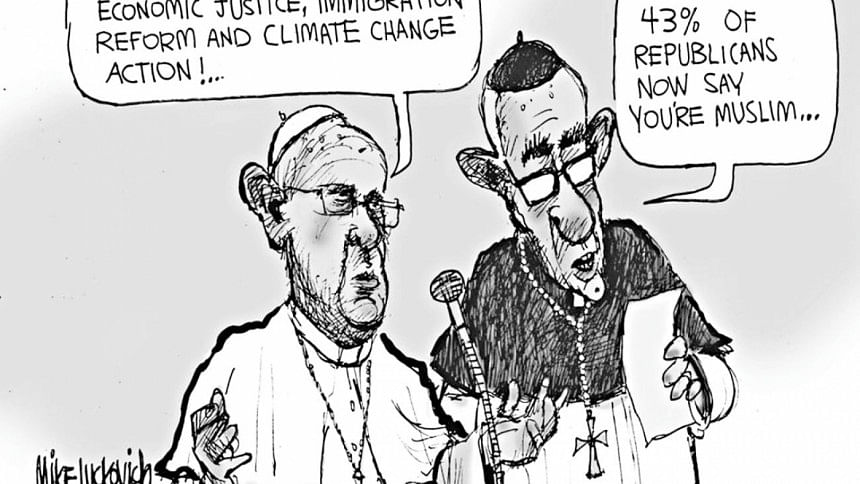Pope with a difference

Pope Francis brings the message of reconciliation to some of the most contentious conflicts and trouble spots in the world. It is a difficult path he has chosen. On the surface, he has advocated for justice, peace and mercy from those who hold power. His style of engagement is a major departure from his predecessor. Given the tight political rope one must walk in global politics, Francis is doing rather well. And he has already made his mark on some of the issues that have been grabbing international media headlines of late. As is evident from his speech at the United Nations, Pope Francis has outlined three priority areas for action: compassion for marginalised people, with particular emphasis on refugees; peace and security; and surprisingly enough, an environmental programme. All three areas fall squarely into what the Church espouses as core values.
The Pontiff has used symbolism and presence on the ground to speak out for the exodus of refugees from Africa to Europe. He has taken up the cause of Muslim refugees fleeing in their hundreds of thousands from the Middle East and Africa (to avoid war and famine) to Europe. Indeed, his first foreign trip was to the island of Lampedusa in 2013, an island in the Mediterranean off Italy to commemorate those who had drowned while trying to swim to shore. The visit by the Pope, his impassioned speech "to reawaken our consciences" ultimately impressed the Italian government into mounting a mission that aided in the rescue of some 150,000 refugees and a clamping down of smuggling rackets.
Pope Francis, it appears, is a man on a mission. Under his stewardship, the Church is in the process of taking a more proactive role for the benefit of refugees. From what has been reported in international media, it is understood that he has asked all Catholic communities in Europe to accommodate at least one refugee family. This is a major departure from the past. This is political action on the ground and it fits squarely with the new line of thinking that the Church should be engaged in spreading Christ's message to a worldwide audience. Given the flurry of visits and speeches the pontiff has been making over the last two years, it is a policy that seems to be working.
There is also full-scale behind-the-scenes diplomatic flurry. In late 2013, the Pope wrote to President Putin on the eve of the G-20 summit in Geneva where a non-military solution was sought in Syria. A decade earlier, Pope John Paul II had made a similar appeal to the United States on the eve of the Iraq invasion; an appeal that had gone unheeded in 2003, was not repeated as the United States backed off from bombing Syria. A more unlikely scenario is Iran, a nation with which the Vatican has maintained unofficial lines of communications since the days of the Shahs. As reported by Foreign Affairs in an article recently, "Three U.S. bishops met with four leading ayatollahs in Iran. They were hosted by the Supreme Council of the Seminary Teachers of Qom, Iran's spiritual center. With backing from the Holy See and a blessing from the U.S. State Department, the participants used the four-day session to establish a dialogue on nuclear weapons and the role of religious leaders in diplomatic engagement." Such activity comes in very useful as a backup measure when usual diplomatic relations sour.
This of course is not the first time the Vatican has come in handy in diffusing tensions in global politics. One cannot forget John Paul II's engagement with President Ronald Reagan, at the height of the Cold War, on the Poland question. However, the present Pope in his short tenure has gone where no Pope has gone before. The pontiff has played his part in the ongoing normalisation of relations between Cuba and the United States. And in doing so, has helped build relations with the White House.
It remains to be seen, however, to what extent the new man in the Vatican will have success in addressing climatic change issues. In what has been outlined in Laudato si' (On Care for Our Common House), a document made available prior to COP21, it is society's orientation towards short-term financial gain and consumerism that has led to the steady destruction of the environment. It is interesting to note that the Pope has deliberately skirted sensitive issues, pointing out that neither capitalism nor market economics are to blame for the situation; rather emphasised the need to have "transparent dialogue" on environmental policy at all levels of decision making. This is political dynamite. Needless to say, political cartoonists have taken swipes at the pontiff's statements, as global leaders and the parties they represent are suspicious of the motives behind such utterances.
At the end of the day, little can be done to dissuade the Pope from making inroads into global issues. His track record at diffusing tense situations, using the office he occupies, in the last two years is impressive. That he has taken to heart environmental degradation as a matter that affects all of humanity is encouraging. However, given that an issue like climate change is a matter that cannot be tackled without consensus amongst developed and emerging economies on so many different levels - from politics to policymaking - judgement is best reserved for now, but we wish him success nonetheless.
The writer is Assistant Editor, The Daily Star.

 For all latest news, follow The Daily Star's Google News channel.
For all latest news, follow The Daily Star's Google News channel. 



Comments